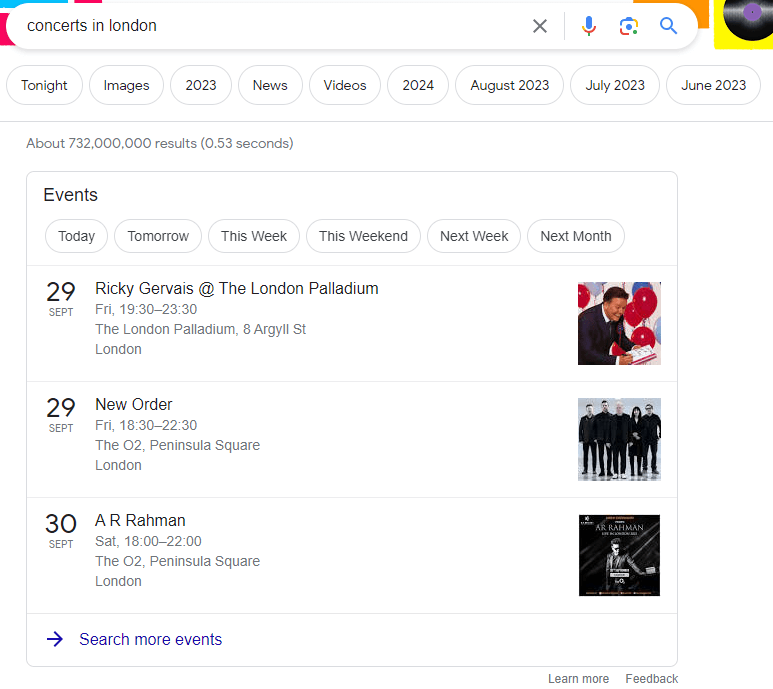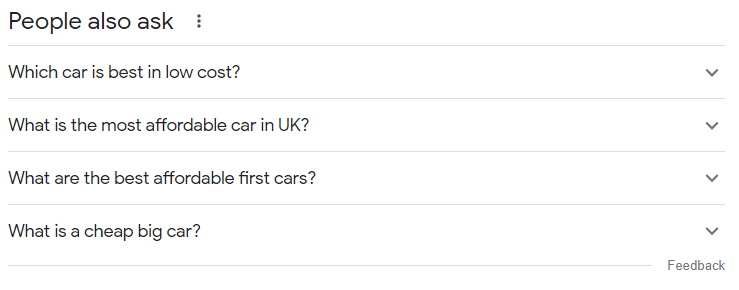Wondering how you can improve your SEO (Search Engine Optimisation) efforts?
If you want to boost your CTRs (click-through rates), generate more organic traffic, or increase your online visibility, you’ll want to learn more about schema markup.
Fortunately, the team of SEO specialists here at Aqueous Digital has years of experience helping our clients to enhance their organic SEO.
As experts on all things SEO, we’ve answered some of the most common and important questions related to schema markup.
From how to use a schema markup checker to analyse your structured data to generating and implementing this data into your own source code, we explain all below.
First and foremost, however, let’s look at the definition of schema markup below.
What is schema markup?
Schema markup is a type of structured data or microdata that helps search engines (like Google, Bing, and Yahoo) to understand the content on your pages. It uses code (a shared vocabulary or language) to describe the elements on your webpages in a way that every major search engine can process.
With this enhanced description of a page, search engines like Google can use this information in SERPs (Search Engine Result Pages) to create a rich snippet and present the information in a more attractive way. This special addition displays extra information about your website such as ratings, reviews, and events.
Schema markup is handy for increasing the visibility and CTRs of a variety of different types of content. As a result, there are many types of schema markup to help improve the ranking position of articles, movies, organisations, local businesses, products, offers, and videos.
How important is schema markup for SEO?
Good SEO revolves around making your website better for online users and search engines, and because schema markup helps search engines to understand your content better (and therefore deliver more relevant results for online users), understanding schema SEO and the role it can play in bolstering your business is crucial.
Carry on reading to discover some of the key SEO benefits of schema markup!
Informs search engines
As online users, we have no problem understanding page content (if it’s well-written). Search engines, on the other hand, require a little more support when it comes to interpreting the purpose of your website content. Cue, the addition of schema markup.
Schema markup is a standardised vocabulary that makes the interpretation of structured data effortless for search engine tech. As a result, search engines can use their algorithms to easily identify the most relevant content to match the user search intent.
Supports rich snippet results
If you want to stand out from your crowd of online competitors by obtaining rich snippets, schema markup could be the solution! On a SERP, you’ll see a selection of search results showing pages from a range of websites.
Typically, they’ll be displayed showing three key components: the page title, the URL, and the meta description. However, a rich snippet is designed to draw more attention from the online user often using stars to show off high ratings or reviews of a certain product or service.

Instead of including this information in your meta description, search engines can pull it from the source code when you decide to implement schema markup on your website.
While search engines may not display rich snippet results for every page on your site with structured data, the addition of schema markup can significantly increase your chances of certain webpages obtaining a rich snippet.
Given there are many different types of rich results, you can categorise your page content to help improve visibility in the right places. For example, you can make it much easier for online users to discover, share, and attend your events by implementing schema markup on event pages.
This event-specific structured data will help your event to appear in the relevant event experience section on Google, typically leading to more organic traffic and conversions.

Helps you to build a credible brand
Schema markup can be used in a variety of ways to grow the credibility of your brand. Some of the most common ways of doing this using structured data is by taking advantage of review and how-to rich snippets.
As the name suggests, review rich snippets can instil trust in potential customers in the SERPs by displaying a positive review of either your company, product, or service. Once you’ve been established as a reliable, source of authority, online users are more likely to click through to your website.
Provides more information about products
One type of schema markup includes product rich results that offer additional information regarding pricing, price drops, reviews, delivery details, and availability. This can help to drive CTRs, especially if your product is more affordable than a competitor’s alternative or is in stock while a competing product is currently unavailable.
Educates your audience
Often, the first impression of your business happens on a SERP for online users. However, before we get to the transactional stage (the process of searching for a product or service), we typically use the internet to help educate ourselves and ensure we’re searching for the right solution to a particular issue.
For example, if you wanted to know what the best car was for your budget, you might search for ‘what is the best affordable car?’. You’d then use the results of this search to look for your ideal vehicle.
Luckily, schema markup can help you to quickly and comprehensively answer a variety of questions your target audience might be asking using FAQ (Frequently Asked Questions) rich results. Adding structured data to your FAQ content can therefore enhance the user experience by offering them efficient answers to their questions.

As a result, your business is more likely to be viewed as a reliable source of information, aiding customer trust and increasing the shareability of your content. This bank of helpful FAQs can also take some stress away from your customer support team by reducing the volume of customer support emails and helping you to save on customer service costs.
Increases CTR, ROI, and conversion rates
While schema markup can be useful for educating your customers, the ultimate goal of many businesses is to drive conversions and boost your ROI (Return on Investment). Fortunately, pages with schema markup tend to perform better than pages without the support of structured data.
This is because online users value extra information. If one result has an informative rich snippet and another doesn’t, it’s more likely that online users will click through to the page with schema markup. You can monitor the performance of pages with schema markup compared to those without using Google Search Console.
Once Google has identified the schema markup using the URL inspection tool, you can record page performance using the Performance report. After a few months of monitoring, you should be able to compare performance by filtering results based on the URL.
Complements the introduction of AI
With artificial intelligence already making waves across almost every industry, it makes sense to prepare your website for this potential search-related AI influx. With schema markup, you’re already cooperating with search engines that utilise machine learning to help understand your content.
If you fail to implement structured data on your website, your content may not be fully understood by AI tools.
Entices potential employees
Google schema guidelines also explain how you can use structured data to improve your job posting webpages. Google has a distinct section for job search results which is populated by job positions that feature structured data.
If Google chooses to display your job listings, they’ll be shown with helpful additional information such as past employee ratings, the company logo, and reviews. This can make all the difference when it comes to attracting new talent into your business.

How do you implement schema markup on a website?
If you want to find out more about implementing schema markup on your own website, then we recommend exploring Google’s Structured Data Guidelines. Once you’re confident that you understand these guidelines, you can use Google’s Structured Data Markup Helper to generate schema markup for your webpages.
To use the tool, all you need to do is select the relevant data type (such as an article, event, job positing, etc.) then paste either the URL or HTML source of the page into the bar at the bottom of the page and select ‘Start Tagging’.
This will generate the appropriate schema markup which you can then add to the relevant webpage. To do this, you will need to navigate to the webpage settings and insert the schema markup into the HTML header.
The exact way to do this will vary depending on your website platform (such as WordPress, Magento, Wix), but the code will need to embedded in the relevant place to ensure search engines can find it. Alternatively, you may want to explore plugins that make embedding schema markup into your webpages much easier.
How do you check schema markups?
If the addition of schema markup to your webpages isn’t having the desired effect, then you may want to check whether the generated code complies with Google’s technical guidelines.
The easiest way to do this is to use a schema markup checker such as Google’s official tool for testing structured data, the Rich Results Test, or the URL Inspection tool.
You may also want to use the Schema Markup Validator tool at Schema.org to test structured data that’s been embedded into webpages without Google-specific warnings.
Combined, these handy tools are designed to spot a wide range of technical errors with your schema markup code. Once you’ve identified these errors, you should refer to Google’s structured data guidelines to rectify any issues.
How can I improve my SEO by schema markup?
The simplest way to improve your SEO efforts using schema markup is to learn more about the different ways schema markup can be utilised and to familiarise yourself with Google’s structured data guidelines.
As the world’s most popular search engine, complying with these guidelines will significantly increase your chances of obtaining rich snippet results. However, it’s important to bear in mind that even if your webpage is marked up correctly, it may not be displayed in the search results.
This can happen for a variety of reasons including the fact that the Google algorithm will always generate the best search results for the user based on a range of variables. This tailored approach means there can be no guarantee that the structured data will be displayed.
Alternatively, why not contact the SEO professionals to help improve your schema SEO? Our expert team of account managers have helped countless clients see real results by implementing a long list of effective technical SEO changes.
Searching for schema SEO support? Contact Aqueous Digital today!
If you’d like to improve the SEO of your website using schema markup, feel free to contact the team of SEO professionals here at Aqueous Digital.
Our team is composed of SEO specialists, knowledgeable copywriters, and experienced web developers to support every aspect of your site’s SEO efforts. Whether you want to boost organic traffic, receive more enquiries, or increase your revenue, our award-winning digital marketing agency can help.
We specialise in reputation management services for high-net-worth individuals, as well as comprehensive content strategies (supported by in-depth keyword and competitor research), and paid and organic SEO.
To find out more about schema markup and the importance of implementing website schema on your site, contact our friendly team.
To get in touch, you can either give us a call on 0800 285 1424, send us your enquiry in an email to , or alternatively, you can also get in touch with our Sheffield team by emailing us at hello@aqueous-digital.co.uk. We hope to hear from you soon!
However you decide to reach out, you can rest assured that our team will get back to you shortly to learn more about your SEO requirements.
We can then arrange a free website health check and a no-obligation consultation to help identify areas for improvement on your site.





